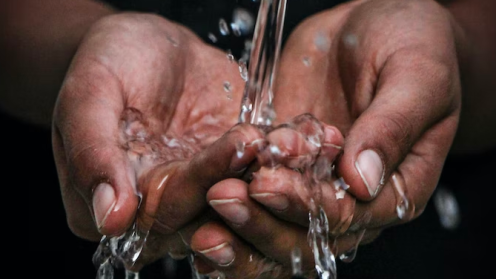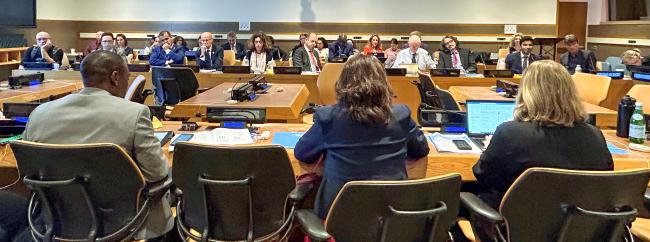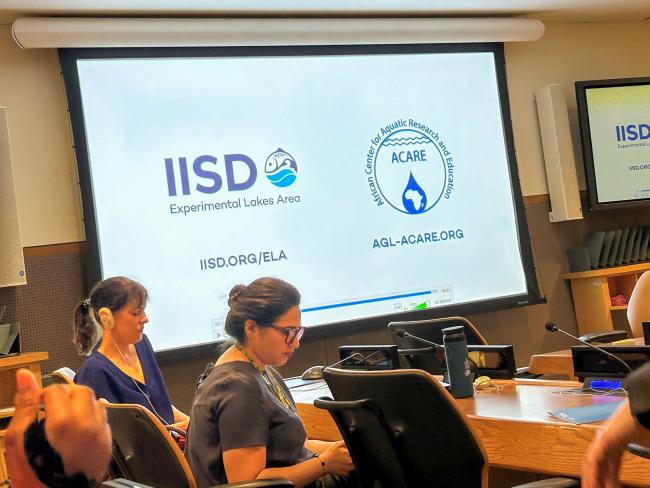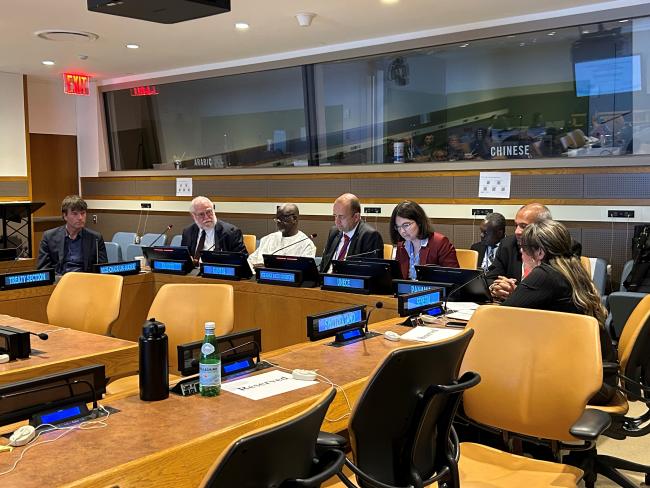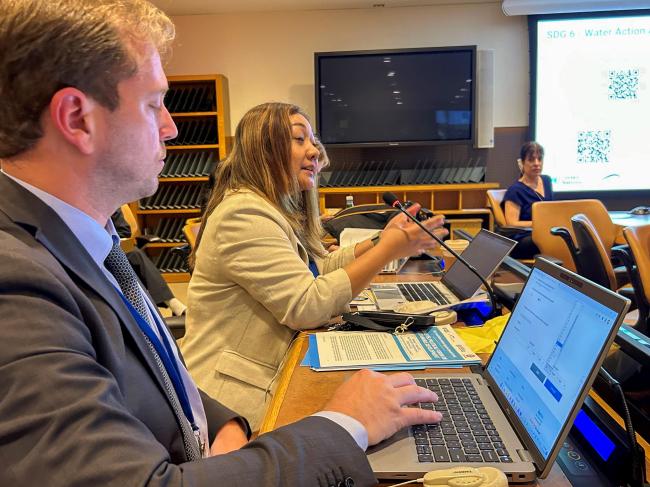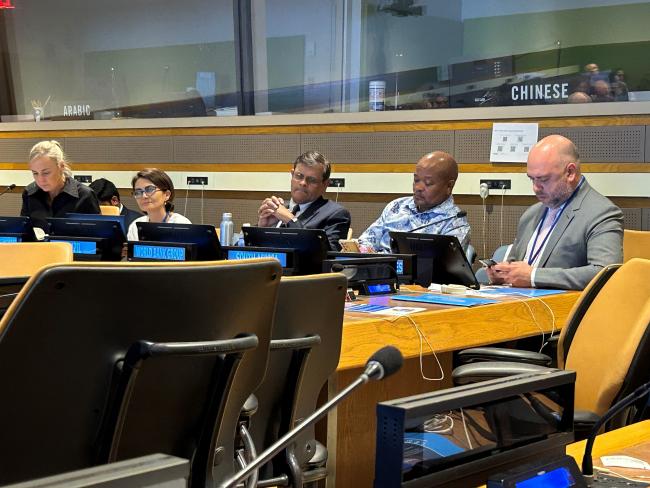About
The 2023 edition of the SDG 6 Special Event focused on the outcomes of the UN 2023 Water Conference, including the almost 830 commitments included in the Water Action Agenda.
The SDG 6 Special Event convenes during annual meetings of the High-level Political Forum (HLPF) to provide space for discussion of the water-related targets in the 2030 Agenda for Sustainable Development. The first Special Event, in 2020, launched the SDG 6 Global Acceleration Framework, which seeks to support accelerated country progress on Sustainable Development Goal 6 (SDG 6; clean water and sanitation) across five key cross-cutting themes: financing; data and information; capacity development; innovation; and governance.
The 2023 edition of the SDG 6 Special Event incorporated an additional focus on the outcomes of the UN 2023 Water Conference. The Conference was co-hosted by Tajikistan and the Netherlands and took place under UN General Assembly auspices in March 2023. It resulted in the Water Action Agenda, which comprises voluntary commitments announced in the lead up to and during the event. Approximately 830 commitments have been published in the Water Action Agenda platform to date.
Speakers also discussed the findings in UN-Water’s SDG 6 Synthesis Report 2023, which was prepared as input to the 2023 HLPF session’s review of SDG 6 progress. Gilbert Houngbo, UN-Water Chair and Director-General, International Labour Organization (ILO), commented that the report provides a “blueprint” to accelerate progress on water and sanitation, including the implementation of Water Action Agenda commitments, through its focus on concrete results and actionable policy recommendations. UN-Water’s recently published SDG 6 Country Acceleration Case Studies, which detail rapid gains being made in Brazil, Ghana and Singapore, were presented by representatives from the three countries.
In addition to seven panel sessions, a treaty ceremony took place during the Special Event to mark the deposit of the instruments of accession by the Gambia to the two UN water conventions.
Additional issues discussed during the full-day event, which was addressed by over 50 high-level panellists on 17 July 2023, at UN Headquarters, included the role of youth in delivering SDG 6 and ideas for how to build a robust global response to the international water crisis. Many government representatives noted their support for convening regular intergovernmental meetings on water, appointing a Special UN Envoy on water, and developing a UN system-wide strategy on water. Mina Guli, Water Advocate and Ultrarunner, served as Master of Ceremonies throughout the day and shared stories from communities she has visited around the world and their “clear message that we need real action now.”
Youth Takeover
The SDG 6 & Water Action Agenda Special Event opened with a “Youth Takeover.” Sarah Breslin, Associate Expert, UN-Water, opened this session highlighting the important role youth play for implementing SDG 6 and the Water Action Agenda. Speakers recalled that approximately half the global population is under 35 and discussed challenges and opportunities to give them a voice in building their future.
Among the youth-led initiatives discussed were: the Water Youth Network, which was launched during the World Water Forum in Dakar, Senegal, in 2022; the African Youth Parliament for Water, which was created in 2022 as an arm of the World Youth Parliament for Water and seeks to connect with governments and bring youth perspectives to policy processes; and the UNESCO Groundwater Youth Network, which brings together 1300 youth to achieve SDG 6.
Speakers highlighted challenges youth face in promoting SDG 6 progress, including:
- decision-making structures in which key stakeholders are not equitably involved;
- the lack of coalitions and partnerships among water-related organisations;
- the consequences of environmental degradation, poverty and unemployment, which decrease the ability of youth to actively contribute to SDG 6 implementation; and
- the lack of accountability mechanisms for the Water Action Agenda.
Speakers proposed treating youth inclusion as a cross-cutting issue and not a stand-alone issue, and suggested creating a youth water envoy. Follow-up mechanisms such as the Youth Takeover session were highlighted as important to ensure youth can effectively engage in the process.
Keynotes
Gilbert Houngbo, UN-Water Chair and ILO Director-General, highlighted the need for: funding; action to fill data gaps; investment in the water and sanitation workforce; and efforts to boost innovation and maximize cooperation. He emphasized the need to integrate water into all relevant governmental decisions and make the SDG 6 Global Acceleration Framework a comprehensive UN system-wide strategy.
Li Junhua, Under-Secretary-General for Economic Development, said the UN system can strengthen its support for SDG 6 progress and implementation of Water Action Agenda commitments at the country level, including through the UN Resident Coordinator system, UN Country Teams and UN country programming instruments such as the common country analysis and UN Sustainable Development Cooperation Framework.
Csaba Kőrösi, President of the 77th Session of the General Assembly, recalled that, during the UN 2023 Water Conference, world leaders committed to take forward the Water Action Agenda, laid the foundation to value water, and recommitted to uphold the human rights to water and sanitation for all. He also noted that the SDG 6 Global Acceleration Framework is the “best in class” toolkit to help accelerate progress.
Zavqizoda Zavqi Amin, Minister of Economic Development and Trade, Tajikistan, said the primary take away from the UN 2023 Water Conference is that the water cycle is a global common good. He also noted that many countries called for the appointment of a special envoy for water.
Steven Collet, Deputy Vice Minister, Ministry of Foreign Affairs, Netherlands, reported the Water Conference welcomed over 10,000 participants from different stakeholder groups. He highlighted the role of the Resident Coordinator system in implementing the Water Action Agenda and stressed that the focus on “managing CO2 has to be matched by equal ambition to manage H2O.”
Charles Iceland, Global Director, Water (Acting), World Resources Institute, reported on his evaluation of the Water Action Agenda commitments received by 8 May 2023. He said approximately half of the commitments address water for health and half address water for sustainable development, while only 24% address water for climate and 13% address water for cooperation. In addition, he said only 20% include quantitative targets. His analysis deemed 28% of the commitments to be “game changing.”
Kelly Ann Naylor, UN-Water SDG 6 Synthesis Report 2023 Lead Writer, reported the report’s findings that, to achieve the SDG 6 targets by 2030, we need to work six times faster on drinking water, five times on sanitation, and three times faster on hygiene. For national-level actions, she highlighted recommendations to strengthen national monitoring systems and invest in the water and sanitation workforce. At the UN-system level, recommendations include: mainstream water into all relevant intergovernmental processes; convene regular intergovernmental meetings and conferences on water; develop a system-wide strategy on water; strengthen UN agencies’ water programmes; and create a UN coordination office to enhance UN-Water’s interagency mandate.
Juhani Damski, Permanent Secretary for the Minister of Environment, Finland, stressed the importance of attention to transboundary water, noting it accounts for 60% of water sources. He also highlighted: strengthened actions are needed to ensure the human rights to water and sanitation; increased financing is needed and the role of the private sector is important; and cross-sectoral management of water is essential to meet the challenges posed by the triple planetary crisis.
Treaty Ceremony
A treaty ceremony for deposit of the instruments of accession by the Gambia to the two UN water conventions took place as part of the Special Event.
Ales Bizjak, Vice-Chair of the UN Water Convention and Ministry of Natural Resources and Spatial Planning, Slovenia, moderated the session and highlighted that over 20 countries from Africa, the Middle East and Latin America are in the process of acceding to the UN Water Convention.
Representatives from two countries that recently acceded to the 1992 Convention on the Protection and Use of Transboundary Watercourses and International Lakes also offered opening comments. Neville Gertze, Ambassador and Permanent Representative of Namibia to the UN, noted his country’s twining agreement with Finland, which is expected to help smooth the accession process. Karima Lince, Director, Ministry of Environment, Panama, highlighted his country’s role as a biological bridge between the Americas.
Immediately prior to submitting his country’s documents to accede to the two United Nations Water Conventions, Musa Drammeh, Minister for Fisheries, Water, and National Assembly Matters, the Gambia, emphasized the role of transboundary water cooperation for achieving the SDGs and peace and stability in the region.
SDG 6 Global Acceleration Framework Themes
The Special Event included sessions organized around the themes of the SDG 6 Global Acceleration Framework, with opening statements from the co-chairs of related interactive dialogues that took place during the UN 2023 Water Conference.
Governance: Sasha Koo-Oshima, Deputy Division Director, Land and Water Division, UN Food and Agriculture Organization (FAO), chaired this session, with opening statements by the Co-Chairs of the Water Conference’s dialogue on Water for Cooperation.
Mohamed Diatta, Coordinator of the Unit for the Follow-up, Promotion and Popularisation of the Recommendations of the 9th World Water Forum, Senegal, stressed the importance of “hydro diplomacy” and cooperation for transboundary water management, noting a role for strengthening basin organizations’ efforts to promote information exchange.
Markus Reubi, Delegate of the Swiss Federal Council for the 2030 Agenda, stressed the need to fast track the adoption of standards and ensure cooperative processes are as inclusive as possible. He noted only 24 countries of the 153 countries that share rivers, lakes and aquifers have their shared water covered by transboundary cooperation agreements.
Issues discussed during this session included: the importance of political will; interlinkages between the water cycle and biodiversity and with the Global Biodiversity Framework; and “source to sea” approaches.
Innovation: Pär Liljert, Director, International Organization for Migration (IOM) Office to the UN, moderated this session. In an opening statement, the Co-Chair of the Water Conference’s dialogue on the Water Action Decade, Nancy Eslick, Senior Deputy Assistant to the Administrator for USAID’s Bureau for Resilience and Food Security, stressed the need for established policy regimes, including standards, regulations, and professional certifications, to support innovation.
Issues discussed during this session included calls for: global cross-sectoral cooperation; addressed the barriers women face when they enter the sector; and innovating in governance in addition to innovating with technology.
Data and Information: Niall Boot, WASH Specialist, UNICEF, moderated this session. The Co-Chairs of the Water Conference’s dialogue on Water for Health & Water for Climate, Resilience and Environment offered opening statements. Rene Mateo, Deputy Minister of Soil and Water and the Ministry of Foreign Affairs, Dominican Republic, stressed the need to help vulnerable countries address the challenges posed by climate change, including through the collection of data. Osama Mahmoud Abdelkhalek Mahmoud, Permanent Representative of Egypt to the UN, reported his country submitted 52 commitments in the Water Action Agenda and launched an initiative during the 27th session of the Conference of the Parties (COP 27) to the UN Framework Convention on Climate Change to address the data gap.
During the discussion, participants noted the role of data in driving action the support synergies among SDGs. The importance of lexicons was also stressed, to help develop a common language. Speakers also stressed that data is a tool and its collection should incorporate Indigenous Peoples’ perspectives on water.
Capacity Development: Rahmah Elfithri, Chief, Capacity Development, and Water Family Coordination, UNESCO, moderated this session. The Co-Chairs of the Water Conference’s dialogue on Water for Climate, Resilience and Environment & Water for Health offered opening statements. Yanagimoto Akira, Parliamentary Vice-Minister of the Environment, Japan, highlighted the need for early warning and early action to address challenges. Adnan Khan, Chief Economist, Foreign, Commonwealth & Development Office, UK, noted the need to align the incentives of actors.
During the discussion, participants noted interlinkages among governance, finance and capacity building. Speakers also noted the importance of capacity at the municipal level, the role multistakeholder process and platforms for ensuring accountability, and mentorship for women.
Financing: Sudipto Sarkar, Lead Water Specialist, World Bank Group, moderated this session. The Co-Chairs of the Water Conference’s dialogue on Water for Sustainable Development offered opening statements. Dai Bing, Deputy Permanent Representative, China, stressed the need for support for the UN to play a role in global water resource coordination. Silvio Gonzato, Deputy Head of the EU Delegation to the UN, noted that, “Without water resilience, there is no economic resilience,” and highlighted the need to value water correctly, including through cost recovery, using the polluter pays principle, and reducing harmful subsidies.
During the discussion, participants were informed that the International High-Level Panel on Water Investments for Africa, which will draw representatives from current and former Heads of State as well as other global leaders, was launched at the 9th World Water Forum in 2022, in Dakar, Senegal. A speaker highlighted the importance of providing financing for initiatives led by young people, including through setting objectives for youth entrepreneurs in advisory projects and undertaking efforts to de-risk investments in youth.
Charting the Course to 2030
Johannes Cullmann, UN-Water Vice-Chair, chaired the closing session. The moderators of each session highlighted key takeaways, including the need to recognize that water is a cross-sectoral issue and requires a cross-sectoral approach. Upcoming opportunities to continue the discussion on the water agenda were noted, including the Rome Water Dialogue in October. Speakers also looked forward to the results of the study by the Commission on New Economics on Water and stressed the need for: definitions to establish a shared language; education about water issues from a young age; and coherent financing plans at the country level.
Majid Al Suwaidi, COP 28 Special Representative, United Arab Emirates, noted planning is underway to incorporate water issues into the COP 28 agenda. He said the COP 28 Presidency would provide further details during World Water Week in August and hoped to permanently entrench water in the climate agenda.
To receive free coverage of global environmental events delivered to your inbox, subscribe to the ENB Update newsletter.
All ENB photos are free to use with attribution. For this side event, please use: Photo by IISD/ENB | Lynn Wagner.
